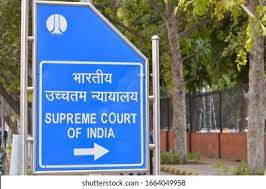(A) Railways Act, 1890, Section 70B – Railways Act, 1989, Section 106(3) – Railway Claims Tribunal Act, 1987, Section(s) 13(1)(b) r/w Section 16(1) – Railway – Claims for refund of the 110 km difference in freight charges – Difference between an “Overcharge” and an “Illegal Charge” – What is the scope of Section 106 sub-section (3) of the Railways Act, 1989? In other words, what constitutes an “overcharge” within the meaning of Section 106 sub-section (3) of the Railways Act, 1989? What is the difference between an “Overcharge” and an “Illegal Charge”? –Held that an Overcharge is effectively concerned with the error in the quantum of what was or should be payable, whereas an illegal charge is solely concerned with whether a particular thing was payable by the law / in conformity with the law or not – An ‘overcharge’ often stems due to a clerical mistake or mis-interpretation or misapplication of law in a particular case, whereas an ‘illegal charge’ stems from a patent error or inherent error in the charge i.e., in contravention of the law and principles of fair play – In other words, in overcharge, the mistake is in the levying of the charge, whereas in illegal charge the error lies in the very substance of the charge itself which is in contravention of the law, even though the charge per-se is permissible by law – Held that there exists a very fine & clear distinction between an overcharge and an illegal charge, and that Section 106 sub-section (3) of the Act, 1989 only applies when the claim is for a refund of an overcharge, for all other charges, be it illegal or not, the said provision will have no application whatsoever. (Para74,75, 90 and 98)
(B) Railways Act, 1890, Section 70B – Railways Act, 1989, Section 106(3) – Railway Claims Tribunal Act, 1987, Section(s) 13(1)(b) r/w Section 16(1) – Railway – Claims for refund of the 110 km difference in freight charges – Applicability of Section 106(3) – Whether, the claim towards the refund of difference of 110 km in freight charges is covered by Section 106 sub-section (3) of the Railways Act, 1989? In other words, Whether the claim is for a refund of an ‘overcharge’? – It is the case of the respondent company herein that at the time of booking the consignments, from Baad to Hisar via Palwal, the notified chargeable distance for calculating freight as per the Local Distance Table was 444 km, and accordingly the respondent company paid the same from time to time – However, subsequently, the appellant railways vide its letter dated 05.07.2005 changed the chargeable distance to 334 km in the revised Local Distance Table and the said revised table was to apply prospectively – Held that since admittedly, what was charged from the respondent was as per the chargeable distance notified and required to be payable by law at that time with nothing in excess, and since the respondent has challenged the very basis or genus of the charge i.e., primary challenge is to the chargeable distance of 444 km in itself and not the incidental quantum of freight levied on the distance of 444 km, and because the same was admittedly charged as per the prevailing law and not due to any misapplication or mistake i.e., as per the old local distance table, this clearly is not a case of overcharge and would not fall within the four corners of Section 106(3) of the Act, 1989. (Para 99, 100, 107)
(C) Railways Act, 1890, Section 70B – Railways Act, 1989, Section 106(3) – Railway Claims Tribunal Act, 1987, Section(s) 13(1)(b) r/w Section 16(1) – Railway – Claims for refund of the 110 km difference in freight charges – Whether, the difference of 110 km in freight is liable to be refunded? In other words, whether the notified chargeable distance of ‘444 km’ was an Illegal Charge or not? – Held that the chargeable distance of 444 km was illegal, for the following reasons: –
(i) That, the effect of the change in methodology on the chargeable distance would not have resulted in a huge difference of 110 km,
(ii) That, there had been neither any change in the route by way of addition of new station nor change in the physical track length of the said route,
(iii) The letter dated 05.07.2005 itself indicates that the change in the chargeable distance of 444 km was due to an error, and has no bearing with the Ministry of Railway’s letter dated 07.04.2004 introducing the new methodology.
(iv) The factum of the appellants themselves granting refund without explaining the reason for the same, despite their stance that the respondent is not entitled to any refund.
(v) The failure of the appellant in establishing that the chargeable distance of444 km was the correct chargeable distance as per the law.
(vi) Concurrent findings of both, the Railway Claims Tribunal and the High Court on the limited aspect of the actual distance being 333.18 km.
Said chargeable distance of 444 km held to be illegal – No infirmity with the impugned judgement and order passed by the High Court – Appeal filed by Railways liable to be dismissed.(Para 137, 138 and 139)
SUPREME COURT OF INDIA
2024 STPL(Web) 194 SC
[2024 INSC 243]
Union Of India Vs. M/S Indian Oil Corporation Ltd
Civil Appeal Nos. 1891-1966 of 2024-Decided on 21-03-2024
https://stpllaw.in/wp-content/uploads/2024/04/2024-STPLWeb-194-SC.pdf







